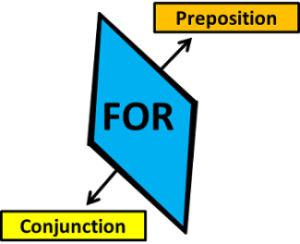What Part of Speech is “FOR”
In the English language, the word “for” has a double function. It can serve as a preposition, or in some cases, as a conjunction.
1. Preposition
The word “for” is classified under prepositions when it is used to indicate the use of something, the location where an object or person is going to, and to show the duration of time. For example, in the sentence:
We waited for five hours.
The word “for” is used to indicate the period of time in which the subject “waited” for “five hours.”
Definition:
a. used as a function word to indicate purpose
- Example:
- He received a grant for studying microbiology.
b. used as a function word to indicate the object or recipient of a perception, desire, or activity
- Example:
- Run for your lives!
c. used to indicate the place someone or something is going to or toward (leaving for paris)
- Example:
- They are leaving for Paris.
d. used as a function word to indicate suitability or fitness (Ready for action)
- Example:
- Are you ready for action?
e. used as a function word to indicate duration of time or extent of space
- Example:
- She was gone for two weeks.
2. Conjunction
In other cases, the word “for” is categorized under the part of speech conjunction, when it is used to connect two clauses in a sentence. This conjunction is somehow similar in meaning with the words “because” or “since.” For instance, in the sample sentence below:
She was tired after her trip, for she had been forced to bike 15 kilometers.
The word “for” is used as a conjunction that indicates reason, and combines the clauses “She was tired after her trip” and “she had been forced to bike 15 kilometers.”
Definition:
a. for the reason that
- Example:
- This bill should be marked as “Paid,” for I mailed it on time.
